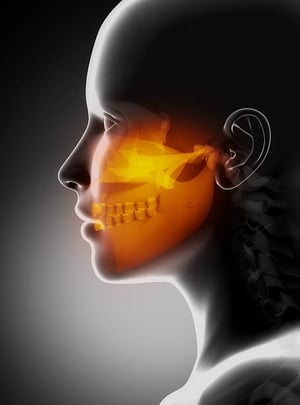 Have you woken up and felt intense pain in your jaw? Or if you’ve been sitting at your desk staring at your screen for hours on end and feel soreness around your jawline? It turns out, just about everyone grinds or clenches their jaw from one way or another. It can be a sign of high nerves, stress, or simply boredom. Up to 70% of Bruxism is triggered by stress! The good news is, it doesn’t cause too much harm and can be categorized as a bad habit if not done too frequently. However, if you are the one grinding or even consistently clenching your teeth, watch out!. Those 'habits' can turn in to be a bigger problem.
Have you woken up and felt intense pain in your jaw? Or if you’ve been sitting at your desk staring at your screen for hours on end and feel soreness around your jawline? It turns out, just about everyone grinds or clenches their jaw from one way or another. It can be a sign of high nerves, stress, or simply boredom. Up to 70% of Bruxism is triggered by stress! The good news is, it doesn’t cause too much harm and can be categorized as a bad habit if not done too frequently. However, if you are the one grinding or even consistently clenching your teeth, watch out!. Those 'habits' can turn in to be a bigger problem.
What is Bruxing?
Bruxism, also known as teeth clenching, is a type of condition in which you, usually unknowingly, grind or clench your teeth. Bruxing may occur when the patient is awake or can involve involuntary and unconscious clenching of the teeth when asleep. A little nerve-racking, isn’t it?
Bruxism that can occur while a patient is asleep usually involves repetitive teeth grinding or teeth clenching. That is what your significant other is hearing at night, it may that and not your snoring keeping them up at night. Did you know that sleep bruxism is also classified as a type of sleep disorder and can be diagnosed with other sleep conditions? Grinding your teeth or clenching your jaw is more than a nervous habit and should not be ignored. This can add up to serious problems for your oral health. Which can include excessive tooth wear and/or the development of Temporomandibular joint syndrome (TMJ).
Topping the list of patient recommendations is to go and visit your dentist. You can discuss the option of ordering a custom-made mouthguard. These are specifically designed to reduce teeth grinding. It is a thin layer of material that protects your top teeth from grinding with your bottom teeth. Yes, an over the counter one from your local store may help, but only for temporary coverage. Those “boil and bite” guards can be too big for your mouth to which you will spit out at night or just not have proper coverage of your teeth. It’s like having a prescription for your eyeglasses. It is custom to YOUR eye site. You wouldn’t be able to put a stranger's glasses on right off the street. By having a custom fit guard or deprogrammer, it will be fitted for you, not a ‘one size fits all.’
Signs and Symptoms of Bruxism
When grinding your teeth, it will most likely occur when you sleep, so in most cases, it can be quite hard to identify. Most of the time, patients are told of this habit by a loved one who can hear them grinding throughout the night. Some cannot believe it! And some absolutely deny it.
Common symptoms of bruxism may include:
Worn, fractured, or chipped teeth
Tired and sore jaw muscles
An increase of tooth pain or sensitivity Grinding or clenching of your teeth Neck, facial, or jaw pain
Worn down tooth enamel
Mild headaches that will originate around the temples
Pain that may feel like it occurs in the ear but no signs of any ear problems
Early Detection
If you are unaware of this habit, your dentist will notice the signs during your oral exam. Excessive wear on your back molars and enamel loss are both indicators of Bruxism.
Be conscious of any signs that may alert you of early detection. This will help put an end to your teeth-grinding pain.
